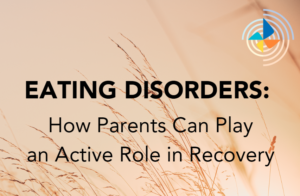Stages of Change
When we decide to change something in our lives, the change doesn’t usually happen right away. Most people go through a few different stages as they get more and more ready to make that change and stick to it. Sometimes, even if want to change, there are internal and external barriers that can make it difficult to act.
It is the same when a person decides to do something about an eating disorder. Some people who are struggling with their eating are more ready to make changes than others are. Understanding the different stages of change can help us understand why some people with eating disorders find it hard to seek help or engage fully with treatment.
Another reason to understand the stages of change, is that some individuals may still need to be in treatment even if they are not yet ready to make changes. For example, if there are severe medical complications or safety concerns. A mental health professional considers many factors when assessing someone for eating disorders and recommending treatment. One of those factors may be the person’s stage of change.
“This path is a journey, a progression, and like climbing to any peak and back down the other side, there are ups and downs. A peak may be high, or a valley low, however the path always moves forward.” ~Melanie
There are 5 main stages that you usually go through when you change something in your life.
Pre-Contemplation. In this stage you:
- are not ready to change because you don’t yet see any reason to
- are not interested in hearing about treatment or getting help
- do not realize you have a problem, or you are not able to admit it
- deny there is anything wrong even when your family, friends and care providers say they are concerned
Contemplation. In this stage, you:
- realize something is wrong or you are ready to acknowledge it
- start thinking about making a change, but you are not yet ready to take action
- may start to learn about different treatments, but you are not yet ready to get help
Preparation. In this stage, you:
- decide that you are going to make a change
- take small steps to prepare for that change
- may look for support from your friends or family members
- might talk to a professional about going into therapy or entering a treatment program
- may change your environment or the people you interact with if it will increase your chances of succeeding
Action. In this stage, you:
- are ready to make the changes needed to get better
- get treatment for your eating disorder
- work to get rid of harmful thoughts or behaviours
- learn ways and strategies to help you cope
- make progress towards a healthier and happier lifestyle
These changes can be hard to make, and even harder to stick with. Action is only the beginning of the change process. Many people go back and forth between stages. Patience and compassion are important as a person progress through the different stages and they may need time and support to contemplate change. There is often a lot of fear and anxiety associated with proceeding through these stages. It is normal for slips and setbacks to happen.
Maintenance. In this stage, you:
- make sure your progress continues, and that the changes are part of your day-to-day life
- stick to your treatment
- reduce or avoid situations which might cause you to slip
- make a relapse prevention plan for coping when you are faced with triggers and slip back to old eating disorder behaviours
- reward yourself for your hard work, and celebrate your success!
Resource List
- Understanding Stages of Change in the Recovery Process ( English )



